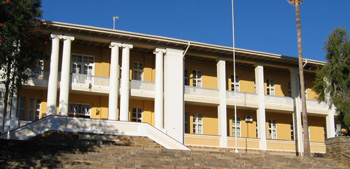
USAID says sustained investments will help provide a pathway for African countries – Remains optimistic about 2022 African Economic Outlook

The Deputy Assistant Administrator for Africa at the United States Agency for International Development (USAID) Tyler Beckelman revealed recently that sustained investments in adaptation and mitigation will help provide a pathway for African countries to develop innovative ways.
The news comes about a week after a team from the African Development Bank Group, led by Acting Chief Economist and Vice President Kevin Urama, was in Washington D.C. and presented the African Economic Outlook 2022, a flagship publication of the Bank, to international thought leaders and other targeted bodies.
The event was hosted by the Atlantic Council under the theme, Supporting Climate Resilience and a Just Energy Transition in Africa, and this year’s report highlights climate change as a growing threat to lives and livelihoods in Africa.
Beckelman elaborated that such investments through renewable energy and climate-smart land use practices, will build a more just and equitable future for people across the continent.
”While the challenges are enormous, we see plenty of reasons to be optimistic,” he said, adding that the African Economic Outlook “cogently and convincingly captures the very real and urgent challenges to realizing a just energy transition in Africa.”
“Make no mistake, the crisis is already here,” Beckelman cautioned. “Four failed rainy seasons in the Horn of Africa, with a fifth likely to occur this summer, is a direct result of a warming climate, and sadly, it may become the norm.”
Moreover, he said the United States would ensure that its African partners have the ability and resources to develop the foundation for a sustainable and low-carbon economy that provides ample energy for growth.
However, a scathing report of the African Economic Outlook 2022 indicated that the economic disruptions stemming from the Russia-Ukraine war could push a further 1.8 million people across the African continent into extreme poverty in 2022. That number could swell with another 2.1 million in 2023.
“The African Economic Outlook makes it clear that the pandemic and the Russia-Ukraine war could leave a lasting impression over several years, if not as much as a decade,” according to the report.
“Meanwhile, around 30 million people in Africa were pushed into extreme poverty in 2021 and about 22 million jobs were lost in the same year because of the pandemic. And the trend is expected to continue through the second half of 2022 and on into 2023.”
Meanwhile, Chief Executive of Bezos Earth Fund, Andrew Steer, urged African and world leaders to think bolder and work more creatively together as they prepare for COP 27, which will take place in Egypt. “We need to make it Africa’s COP. So, what the African Development Bank and the Atlantic Council are trying to do to raise awareness is exceedingly important,” suggested Steer.
In a presentation on the report, Acting Chief Economist Urama called for policy coordination and a more holistic approach to tackling climate change. “We have been losing 5% to 15% of GDP per capita growth in Africa because of climate change, and that is in addition to other issues that climate change is driving on the continent,” Urama said, adding that amid these difficulties lie opportunities for innovation.
”As we prepare for COP 27, honoring the 2009 $100 billion yearly climate finance commitment that high-income countries promised to developing countries will help to restore confidence that we are serious about climate change, even though it is not enough,” Urama concluded.












































